Mental Health and Counseling Psychology: Grief Comparison and Contrast
VerifiedAdded on 2023/04/26
|6
|1338
|280
Essay
AI Summary
This paper, focusing on mental health and counseling psychology, examines three distinct types of grief: normal bereavement, complicated grief, and anticipatory grief. It begins by defining bereavement as the loss of a loved one and grief as the individual's response to that loss. The paper contrasts normal bereavement, a typical reaction to loss, with complicated grief, which is prolonged and debilitating. It also explores anticipatory grief, experienced when a loved one's death is expected. The paper highlights the unique characteristics, causes, and effects of each grief type, including social isolation, health issues, and emotional distress. It then outlines the respective treatments, such as clinical treatment, psychotherapy, and Cognitive Behavior Therapy (CBT), and their potential outcomes. In conclusion, the paper emphasizes the differences between the three grief types and the similarities in their associated symptoms. The paper underscores the importance of understanding these distinctions for effective counseling and mental health support.
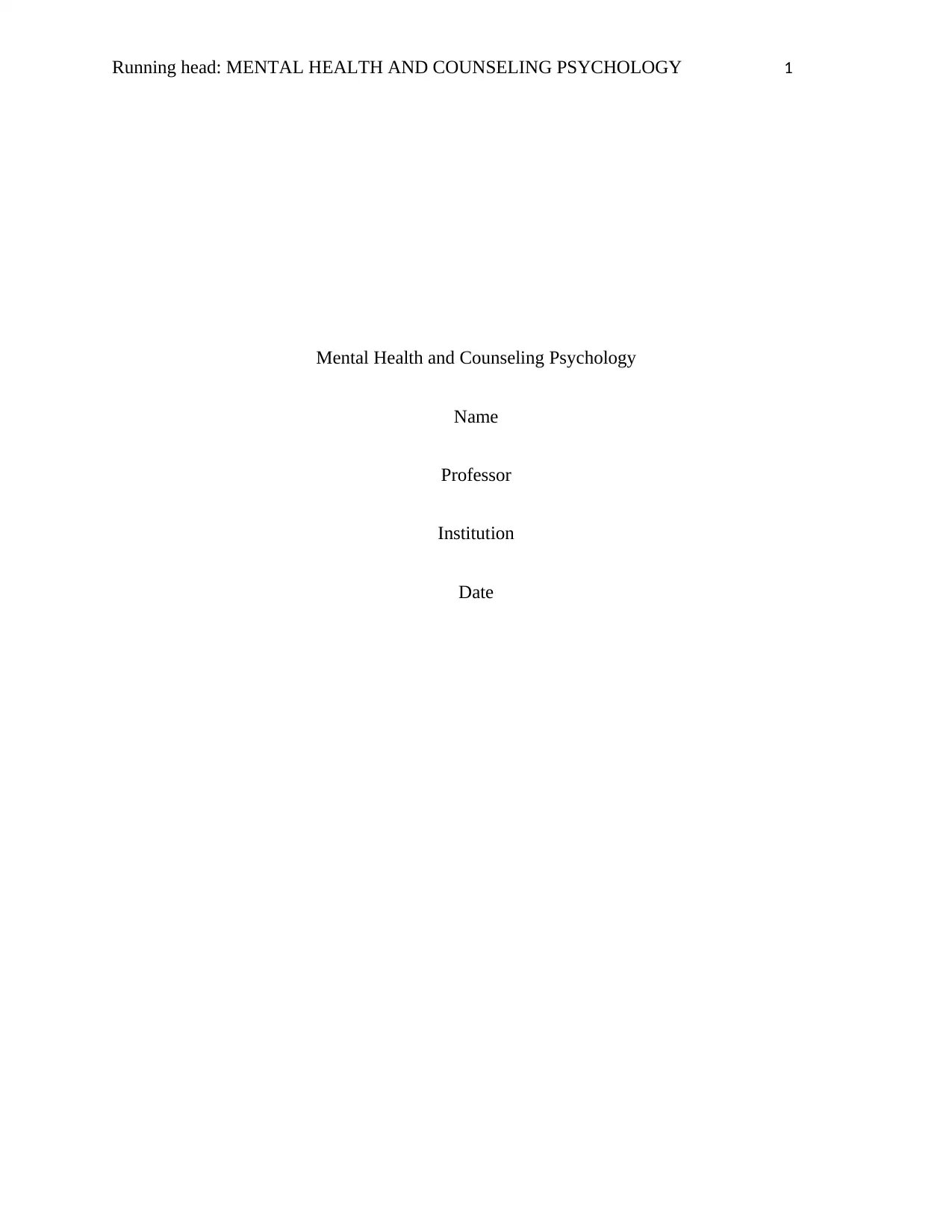
Running head: MENTAL HEALTH AND COUNSELING PSYCHOLOGY 1
Mental Health and Counseling Psychology
Name
Professor
Institution
Date
Mental Health and Counseling Psychology
Name
Professor
Institution
Date
Paraphrase This Document
Need a fresh take? Get an instant paraphrase of this document with our AI Paraphraser
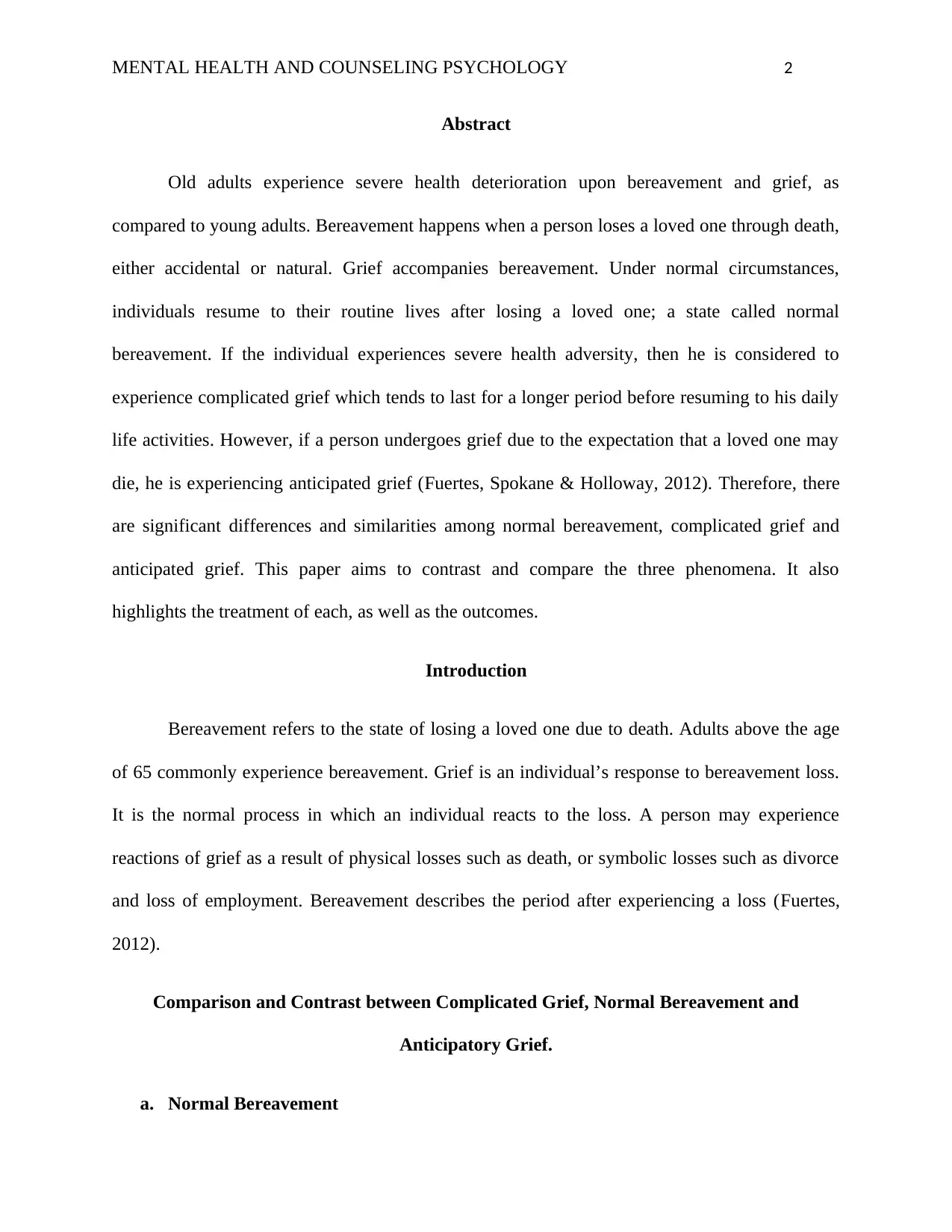
MENTAL HEALTH AND COUNSELING PSYCHOLOGY 2
Abstract
Old adults experience severe health deterioration upon bereavement and grief, as
compared to young adults. Bereavement happens when a person loses a loved one through death,
either accidental or natural. Grief accompanies bereavement. Under normal circumstances,
individuals resume to their routine lives after losing a loved one; a state called normal
bereavement. If the individual experiences severe health adversity, then he is considered to
experience complicated grief which tends to last for a longer period before resuming to his daily
life activities. However, if a person undergoes grief due to the expectation that a loved one may
die, he is experiencing anticipated grief (Fuertes, Spokane & Holloway, 2012). Therefore, there
are significant differences and similarities among normal bereavement, complicated grief and
anticipated grief. This paper aims to contrast and compare the three phenomena. It also
highlights the treatment of each, as well as the outcomes.
Introduction
Bereavement refers to the state of losing a loved one due to death. Adults above the age
of 65 commonly experience bereavement. Grief is an individual’s response to bereavement loss.
It is the normal process in which an individual reacts to the loss. A person may experience
reactions of grief as a result of physical losses such as death, or symbolic losses such as divorce
and loss of employment. Bereavement describes the period after experiencing a loss (Fuertes,
2012).
Comparison and Contrast between Complicated Grief, Normal Bereavement and
Anticipatory Grief.
a. Normal Bereavement
Abstract
Old adults experience severe health deterioration upon bereavement and grief, as
compared to young adults. Bereavement happens when a person loses a loved one through death,
either accidental or natural. Grief accompanies bereavement. Under normal circumstances,
individuals resume to their routine lives after losing a loved one; a state called normal
bereavement. If the individual experiences severe health adversity, then he is considered to
experience complicated grief which tends to last for a longer period before resuming to his daily
life activities. However, if a person undergoes grief due to the expectation that a loved one may
die, he is experiencing anticipated grief (Fuertes, Spokane & Holloway, 2012). Therefore, there
are significant differences and similarities among normal bereavement, complicated grief and
anticipated grief. This paper aims to contrast and compare the three phenomena. It also
highlights the treatment of each, as well as the outcomes.
Introduction
Bereavement refers to the state of losing a loved one due to death. Adults above the age
of 65 commonly experience bereavement. Grief is an individual’s response to bereavement loss.
It is the normal process in which an individual reacts to the loss. A person may experience
reactions of grief as a result of physical losses such as death, or symbolic losses such as divorce
and loss of employment. Bereavement describes the period after experiencing a loss (Fuertes,
2012).
Comparison and Contrast between Complicated Grief, Normal Bereavement and
Anticipatory Grief.
a. Normal Bereavement
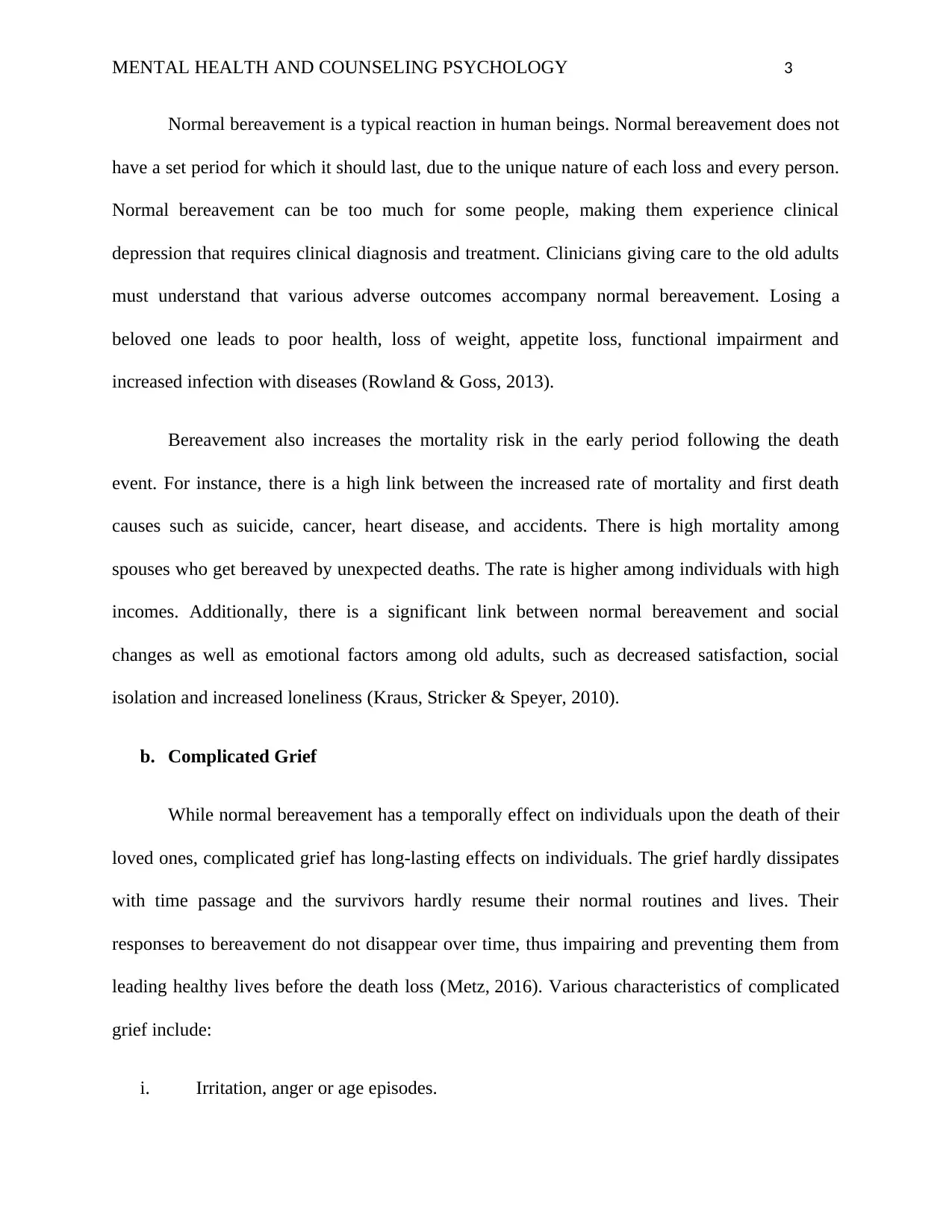
MENTAL HEALTH AND COUNSELING PSYCHOLOGY 3
Normal bereavement is a typical reaction in human beings. Normal bereavement does not
have a set period for which it should last, due to the unique nature of each loss and every person.
Normal bereavement can be too much for some people, making them experience clinical
depression that requires clinical diagnosis and treatment. Clinicians giving care to the old adults
must understand that various adverse outcomes accompany normal bereavement. Losing a
beloved one leads to poor health, loss of weight, appetite loss, functional impairment and
increased infection with diseases (Rowland & Goss, 2013).
Bereavement also increases the mortality risk in the early period following the death
event. For instance, there is a high link between the increased rate of mortality and first death
causes such as suicide, cancer, heart disease, and accidents. There is high mortality among
spouses who get bereaved by unexpected deaths. The rate is higher among individuals with high
incomes. Additionally, there is a significant link between normal bereavement and social
changes as well as emotional factors among old adults, such as decreased satisfaction, social
isolation and increased loneliness (Kraus, Stricker & Speyer, 2010).
b. Complicated Grief
While normal bereavement has a temporally effect on individuals upon the death of their
loved ones, complicated grief has long-lasting effects on individuals. The grief hardly dissipates
with time passage and the survivors hardly resume their normal routines and lives. Their
responses to bereavement do not disappear over time, thus impairing and preventing them from
leading healthy lives before the death loss (Metz, 2016). Various characteristics of complicated
grief include:
i. Irritation, anger or age episodes.
Normal bereavement is a typical reaction in human beings. Normal bereavement does not
have a set period for which it should last, due to the unique nature of each loss and every person.
Normal bereavement can be too much for some people, making them experience clinical
depression that requires clinical diagnosis and treatment. Clinicians giving care to the old adults
must understand that various adverse outcomes accompany normal bereavement. Losing a
beloved one leads to poor health, loss of weight, appetite loss, functional impairment and
increased infection with diseases (Rowland & Goss, 2013).
Bereavement also increases the mortality risk in the early period following the death
event. For instance, there is a high link between the increased rate of mortality and first death
causes such as suicide, cancer, heart disease, and accidents. There is high mortality among
spouses who get bereaved by unexpected deaths. The rate is higher among individuals with high
incomes. Additionally, there is a significant link between normal bereavement and social
changes as well as emotional factors among old adults, such as decreased satisfaction, social
isolation and increased loneliness (Kraus, Stricker & Speyer, 2010).
b. Complicated Grief
While normal bereavement has a temporally effect on individuals upon the death of their
loved ones, complicated grief has long-lasting effects on individuals. The grief hardly dissipates
with time passage and the survivors hardly resume their normal routines and lives. Their
responses to bereavement do not disappear over time, thus impairing and preventing them from
leading healthy lives before the death loss (Metz, 2016). Various characteristics of complicated
grief include:
i. Irritation, anger or age episodes.
⊘ This is a preview!⊘
Do you want full access?
Subscribe today to unlock all pages.

Trusted by 1+ million students worldwide
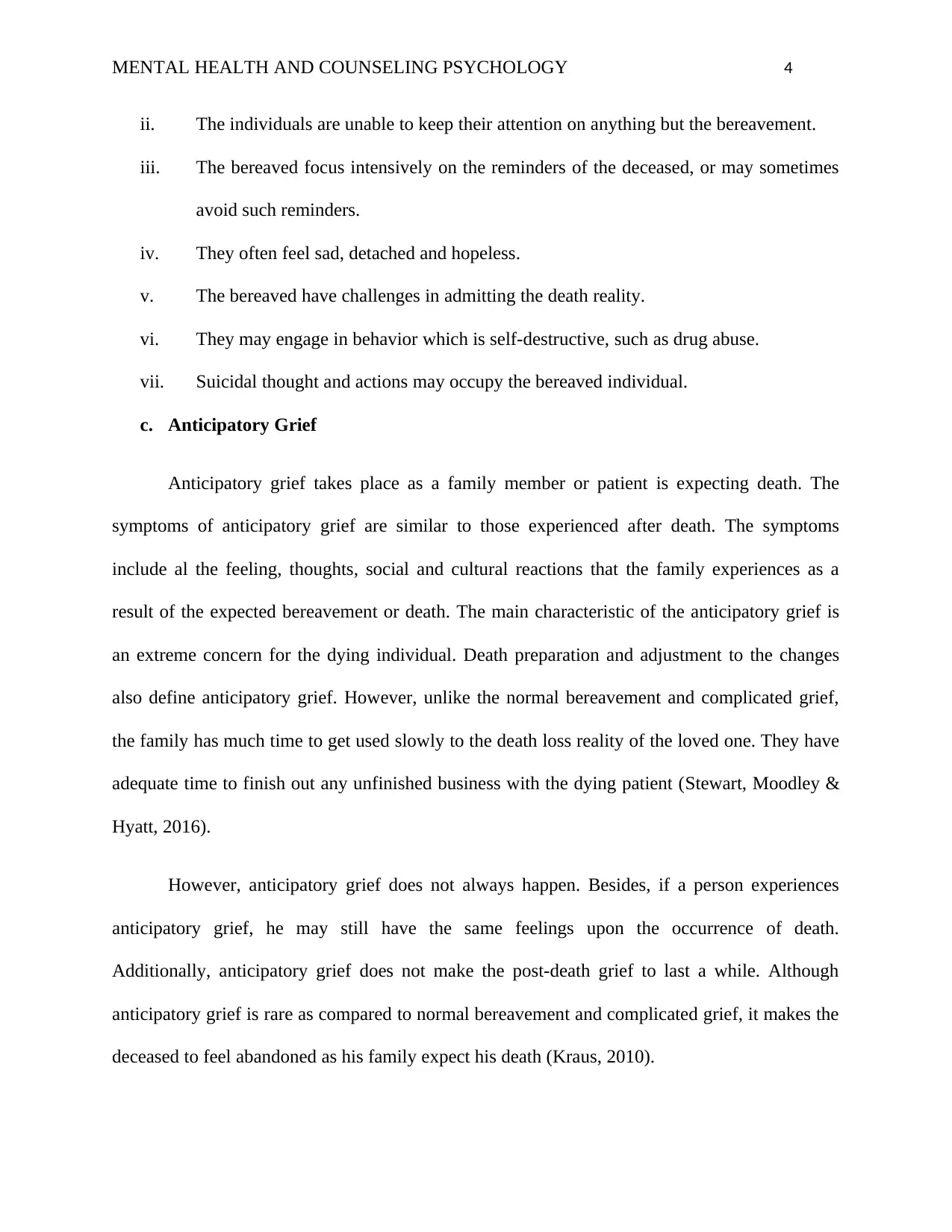
MENTAL HEALTH AND COUNSELING PSYCHOLOGY 4
ii. The individuals are unable to keep their attention on anything but the bereavement.
iii. The bereaved focus intensively on the reminders of the deceased, or may sometimes
avoid such reminders.
iv. They often feel sad, detached and hopeless.
v. The bereaved have challenges in admitting the death reality.
vi. They may engage in behavior which is self-destructive, such as drug abuse.
vii. Suicidal thought and actions may occupy the bereaved individual.
c. Anticipatory Grief
Anticipatory grief takes place as a family member or patient is expecting death. The
symptoms of anticipatory grief are similar to those experienced after death. The symptoms
include al the feeling, thoughts, social and cultural reactions that the family experiences as a
result of the expected bereavement or death. The main characteristic of the anticipatory grief is
an extreme concern for the dying individual. Death preparation and adjustment to the changes
also define anticipatory grief. However, unlike the normal bereavement and complicated grief,
the family has much time to get used slowly to the death loss reality of the loved one. They have
adequate time to finish out any unfinished business with the dying patient (Stewart, Moodley &
Hyatt, 2016).
However, anticipatory grief does not always happen. Besides, if a person experiences
anticipatory grief, he may still have the same feelings upon the occurrence of death.
Additionally, anticipatory grief does not make the post-death grief to last a while. Although
anticipatory grief is rare as compared to normal bereavement and complicated grief, it makes the
deceased to feel abandoned as his family expect his death (Kraus, 2010).
ii. The individuals are unable to keep their attention on anything but the bereavement.
iii. The bereaved focus intensively on the reminders of the deceased, or may sometimes
avoid such reminders.
iv. They often feel sad, detached and hopeless.
v. The bereaved have challenges in admitting the death reality.
vi. They may engage in behavior which is self-destructive, such as drug abuse.
vii. Suicidal thought and actions may occupy the bereaved individual.
c. Anticipatory Grief
Anticipatory grief takes place as a family member or patient is expecting death. The
symptoms of anticipatory grief are similar to those experienced after death. The symptoms
include al the feeling, thoughts, social and cultural reactions that the family experiences as a
result of the expected bereavement or death. The main characteristic of the anticipatory grief is
an extreme concern for the dying individual. Death preparation and adjustment to the changes
also define anticipatory grief. However, unlike the normal bereavement and complicated grief,
the family has much time to get used slowly to the death loss reality of the loved one. They have
adequate time to finish out any unfinished business with the dying patient (Stewart, Moodley &
Hyatt, 2016).
However, anticipatory grief does not always happen. Besides, if a person experiences
anticipatory grief, he may still have the same feelings upon the occurrence of death.
Additionally, anticipatory grief does not make the post-death grief to last a while. Although
anticipatory grief is rare as compared to normal bereavement and complicated grief, it makes the
deceased to feel abandoned as his family expect his death (Kraus, 2010).
Paraphrase This Document
Need a fresh take? Get an instant paraphrase of this document with our AI Paraphraser
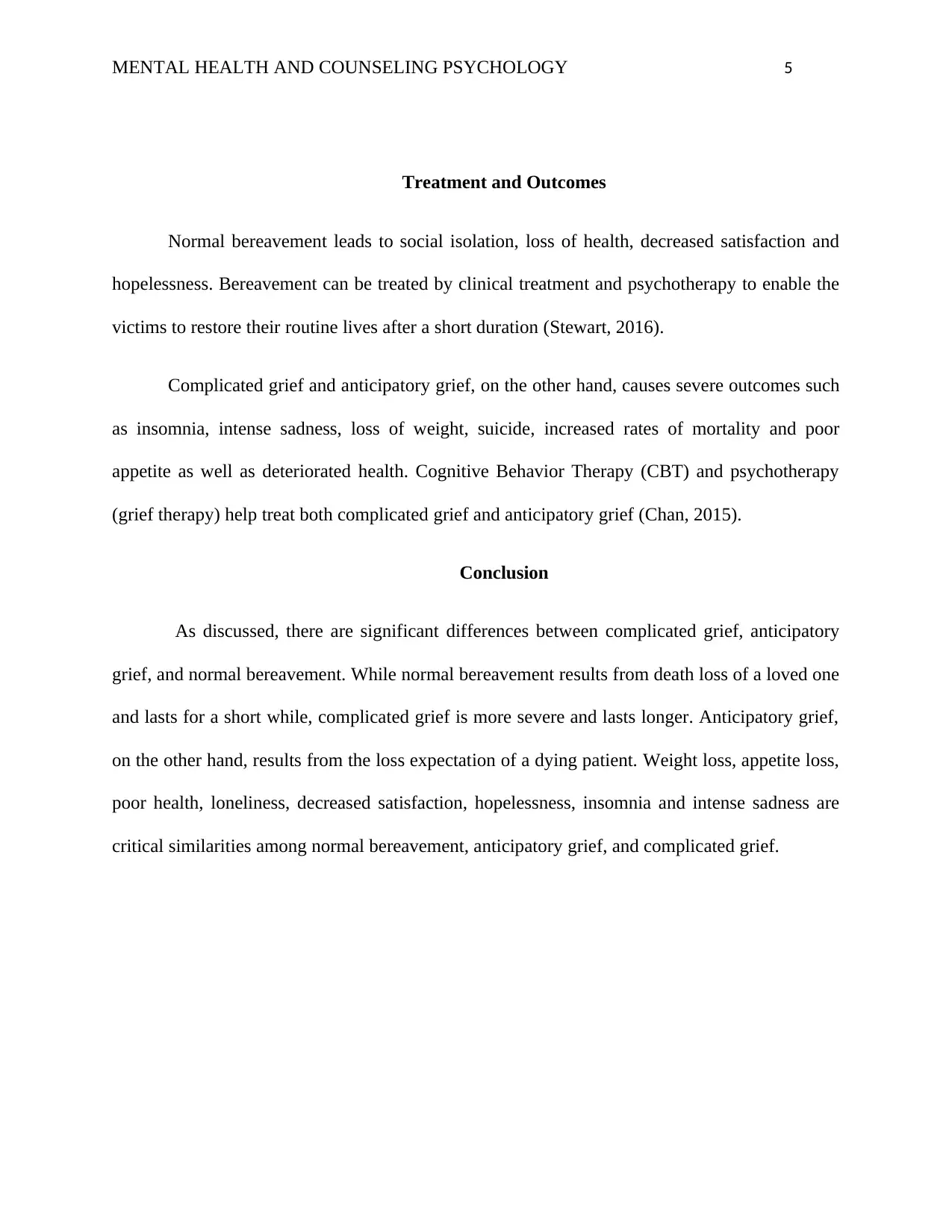
MENTAL HEALTH AND COUNSELING PSYCHOLOGY 5
Treatment and Outcomes
Normal bereavement leads to social isolation, loss of health, decreased satisfaction and
hopelessness. Bereavement can be treated by clinical treatment and psychotherapy to enable the
victims to restore their routine lives after a short duration (Stewart, 2016).
Complicated grief and anticipatory grief, on the other hand, causes severe outcomes such
as insomnia, intense sadness, loss of weight, suicide, increased rates of mortality and poor
appetite as well as deteriorated health. Cognitive Behavior Therapy (CBT) and psychotherapy
(grief therapy) help treat both complicated grief and anticipatory grief (Chan, 2015).
Conclusion
As discussed, there are significant differences between complicated grief, anticipatory
grief, and normal bereavement. While normal bereavement results from death loss of a loved one
and lasts for a short while, complicated grief is more severe and lasts longer. Anticipatory grief,
on the other hand, results from the loss expectation of a dying patient. Weight loss, appetite loss,
poor health, loneliness, decreased satisfaction, hopelessness, insomnia and intense sadness are
critical similarities among normal bereavement, anticipatory grief, and complicated grief.
Treatment and Outcomes
Normal bereavement leads to social isolation, loss of health, decreased satisfaction and
hopelessness. Bereavement can be treated by clinical treatment and psychotherapy to enable the
victims to restore their routine lives after a short duration (Stewart, 2016).
Complicated grief and anticipatory grief, on the other hand, causes severe outcomes such
as insomnia, intense sadness, loss of weight, suicide, increased rates of mortality and poor
appetite as well as deteriorated health. Cognitive Behavior Therapy (CBT) and psychotherapy
(grief therapy) help treat both complicated grief and anticipatory grief (Chan, 2015).
Conclusion
As discussed, there are significant differences between complicated grief, anticipatory
grief, and normal bereavement. While normal bereavement results from death loss of a loved one
and lasts for a short while, complicated grief is more severe and lasts longer. Anticipatory grief,
on the other hand, results from the loss expectation of a dying patient. Weight loss, appetite loss,
poor health, loneliness, decreased satisfaction, hopelessness, insomnia and intense sadness are
critical similarities among normal bereavement, anticipatory grief, and complicated grief.
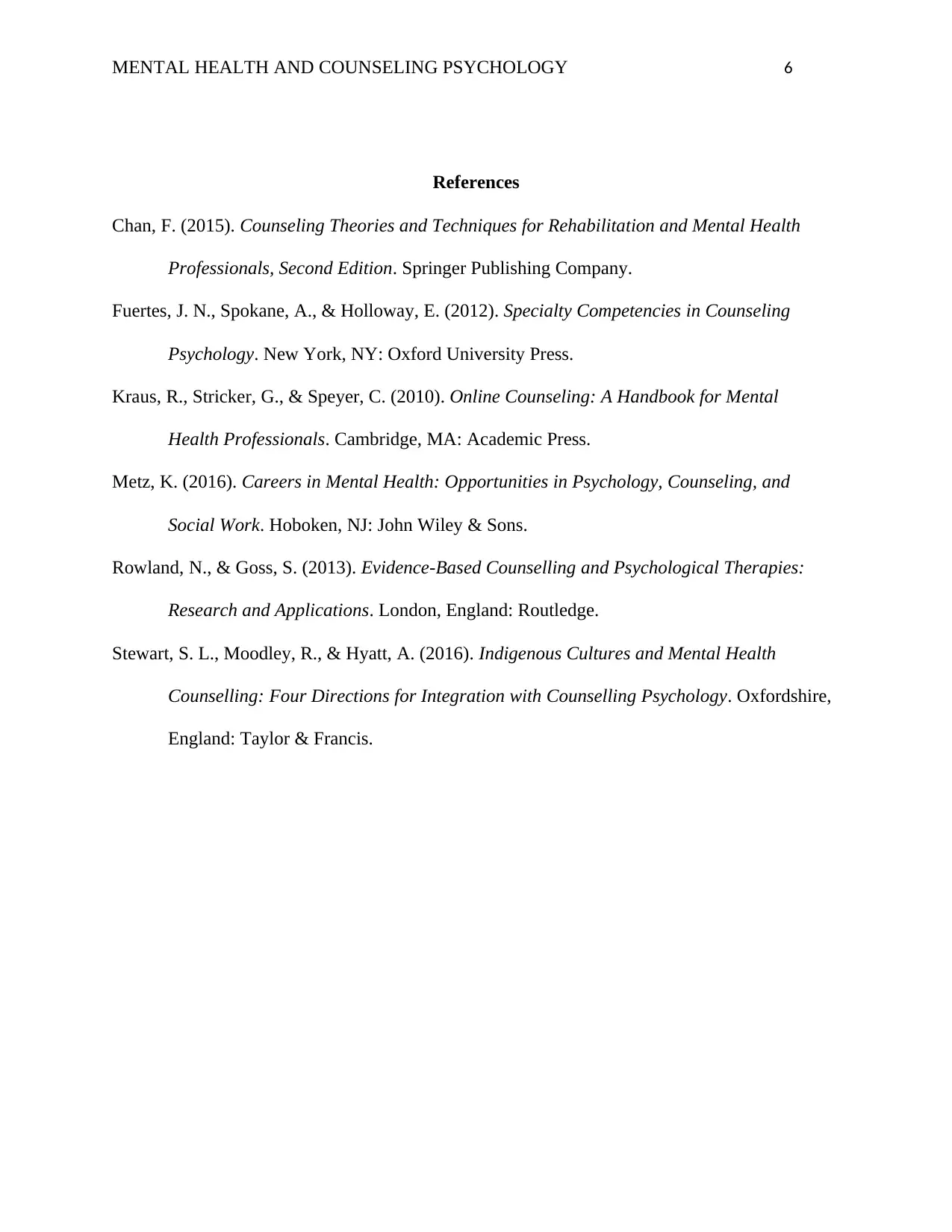
MENTAL HEALTH AND COUNSELING PSYCHOLOGY 6
References
Chan, F. (2015). Counseling Theories and Techniques for Rehabilitation and Mental Health
Professionals, Second Edition. Springer Publishing Company.
Fuertes, J. N., Spokane, A., & Holloway, E. (2012). Specialty Competencies in Counseling
Psychology. New York, NY: Oxford University Press.
Kraus, R., Stricker, G., & Speyer, C. (2010). Online Counseling: A Handbook for Mental
Health Professionals. Cambridge, MA: Academic Press.
Metz, K. (2016). Careers in Mental Health: Opportunities in Psychology, Counseling, and
Social Work. Hoboken, NJ: John Wiley & Sons.
Rowland, N., & Goss, S. (2013). Evidence-Based Counselling and Psychological Therapies:
Research and Applications. London, England: Routledge.
Stewart, S. L., Moodley, R., & Hyatt, A. (2016). Indigenous Cultures and Mental Health
Counselling: Four Directions for Integration with Counselling Psychology. Oxfordshire,
England: Taylor & Francis.
References
Chan, F. (2015). Counseling Theories and Techniques for Rehabilitation and Mental Health
Professionals, Second Edition. Springer Publishing Company.
Fuertes, J. N., Spokane, A., & Holloway, E. (2012). Specialty Competencies in Counseling
Psychology. New York, NY: Oxford University Press.
Kraus, R., Stricker, G., & Speyer, C. (2010). Online Counseling: A Handbook for Mental
Health Professionals. Cambridge, MA: Academic Press.
Metz, K. (2016). Careers in Mental Health: Opportunities in Psychology, Counseling, and
Social Work. Hoboken, NJ: John Wiley & Sons.
Rowland, N., & Goss, S. (2013). Evidence-Based Counselling and Psychological Therapies:
Research and Applications. London, England: Routledge.
Stewart, S. L., Moodley, R., & Hyatt, A. (2016). Indigenous Cultures and Mental Health
Counselling: Four Directions for Integration with Counselling Psychology. Oxfordshire,
England: Taylor & Francis.
⊘ This is a preview!⊘
Do you want full access?
Subscribe today to unlock all pages.

Trusted by 1+ million students worldwide
1 out of 6
Related Documents
Your All-in-One AI-Powered Toolkit for Academic Success.
+13062052269
info@desklib.com
Available 24*7 on WhatsApp / Email
![[object Object]](/_next/static/media/star-bottom.7253800d.svg)
Unlock your academic potential
Copyright © 2020–2026 A2Z Services. All Rights Reserved. Developed and managed by ZUCOL.





